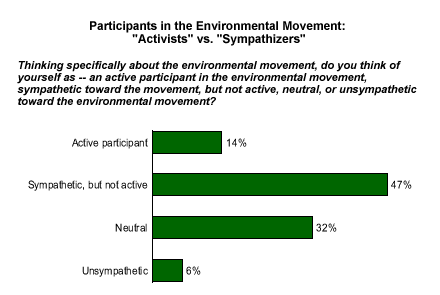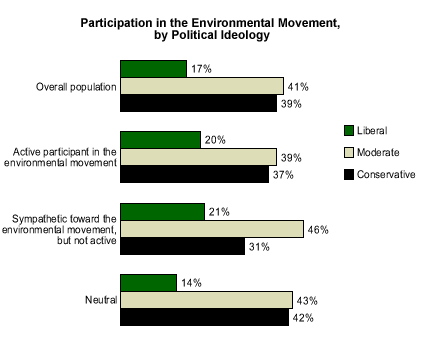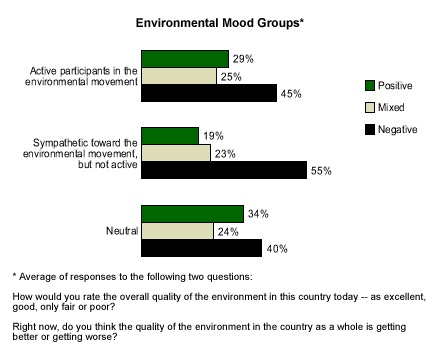Earth Day celebrations and demonstrations may be somewhat subdued this year because of the war, but on April 22, ardent environmental advocates will nonetheless take part in hundreds of events designed to raise awareness about environmental concerns.
If you spoke with a cross-section of those advocates, you might come away surprised about who they are. Environmental activists have been cast as aberrantly liberal, tending to overstate the impact of ecological degradation to further their cause. ║┌┴¤═° data paint a different picture of those who say they are "active" in the environmental movement.
║┌┴¤═°'s March 2003 survey on Earth concerns* asked respondents where they stand on the environmental movement: whether they are active environmentalists, sympathetic to the movement but not active, neutral, or opposed to the movement. Americans' responses were distributed as follows:

Who's a Liberal?
A ║┌┴¤═° Poll Tuesday Briefing article based on last year's environmentalism survey noted that those categorizing themselves as activists share many of the same views as those who say they are environmental sympathizers, but they also tend to differ in some interesting ways (see "Environmental Activists: Extreme to Mainstream" in Related Items). This year's data indicate that activists are no more likely than sympathizers to say they are liberal, and only slightly more likely than neutral respondents to say so. Neither group's ideological breakdown is terribly different from that of the sample as a whole: 17% liberal, 41% moderate, 39% conservative.

As last year's article noted, activists tend to differ from sympathizers not in the direction of their attitudes, but in the magnitude -- namely, they have a higher level of emotional investment in environmental issues. In many cases, that heightened level of concern in this area may cause the likelihood to call oneself "active" in the environmental movement to be held separate from other ideological concerns.
We Can Fix It
These data also contest the notion that many ardent environmentalists play the role of doomsayer to draw attention to environmental concerns. Though most are not overly optimistic about environmental conditions, activists are significantly more likely to be optimistic than those in the sympathizer group, and no more likely than any other group to say conditions are "poor." Forty-one percent of activists rate the quality of the environment as "excellent" or "good," compared with 33% of sympathizers, and 49% of those who say they're neutral toward the movement. About 1 in 10 of all three groups rate current environmental conditions as poor.
║┌┴¤═° divides respondents into environmental "outlook" groups based on their attitudes about present and future conditions. As the graph below indicates, activists are closer to neutrals than they are to sympathizers when it comes to positivity about the environment.

Bottom Line
While a common perception is for those more active in environmental matters to hold more pessimistic views about the state of the environmental conditions in the United States, ║┌┴¤═° data show that environmental "activists" hold somewhat more positive views than those who say they are sympathetic to the environmental movement, but not active. Thus, any portrayal of dedicated environmentalists as particularly liberal or unduly pessimistic does not seem to hold up here.
*Results are based on telephone interviews with 1,003 national adults, aged 18 and older, conducted March 3-5 2003. For results based on the total sample of national adults, one can say with 95% confidence that the maximum margin of sampling error is ±3%.
